Words of Wisdom - Shastra
& Shastrakaras speak
For Books and shastra downloads see Main Index, under
Books:
Om Namo Bhagavate Vasudevaya
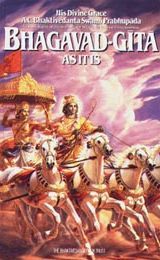
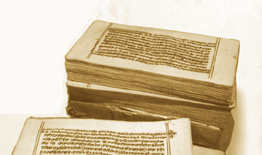
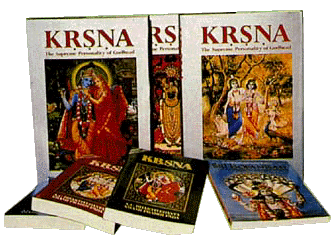
The Complete Works of Srila Prabhupada
All the books, the letters and conversations at your
fingertips


All Srila Prabhupada's books and more on one disk
http://www.vedabase.com





Srila Prabhupada's Audio lectures to listen to on-line:
http://www.hare-krishna.org/srila-prabhupada-lectures.htm
Listen to Srila A.C. Bhaktivedanta Swami Prabhupada on-line
- all 900 of his lectures are available HERE:
http://www.prabhupadavani.org/
Srimad Bhagavatam - the entire lecture series listen and
read along on-line - Narrated by Amala Bhakta dasa:
http://www.prabhupadavani.org/SB_index.html
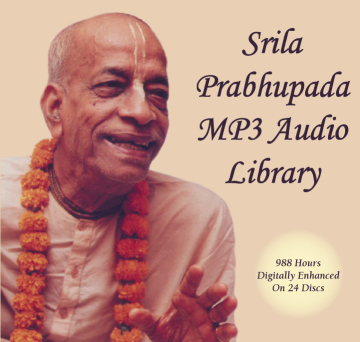
The new enhanced Prabhupada MP3 series
http://www.prabhupada.com/store/store.php?page=product.php&id=MP3AUDIOLIB

The Audio Srila Prabhupada Lilamrita
Please find enclosed details a being launched on Gaura Purnima day 2008.
It is a simple audio rendition of sections from "Prabhupada,
your ever well-wisher" by Satsvarupa dasa Goswami.
It was recorded here in the UK back in the mid '90's
by Bhagavat-Asraya prabhu (ACBSP) at my studio and I edited it into 8 short
instalments for inclusion on my weekly radio programme "Nectar of Devotion".
We had such a good response from listeners that it was
decided to add "The Audio Srila Prabhupada Lilamrita" to the Nectar of
Devotion website archive page.
In doing so I felt it might be nice to create a very simple,
seperate website for the Lilamrita.
The result is http://www.lilamrita.page.tl
It will be officially launched on Gaura Purnima day 2008
for the pleasure of Srila Prabhupada and all the Vaishnava's.
I hope this humble attempt will add to the growing appreciation
of Srila Prabhupada's remarkable achievements.
If other Krishna conscious radio stations would like
to broadcast this Lilamrita series they can contact me at devotion@nusoundradio.com
and I can send them mp3 copies.

Srila Prabhupada Vyasa-puja book 2007
http://www.krishna.com/node/1048
Vyasa-puja is an annual celebration by the devotees of Lord Krishna
to offer homage to their guru, or spiritual teacher.
There are two versions of the Vyasa Puja Book based on the speed of
your internet connection.
If you are unable to open the file, download Acrobat Reader.
High speed connections, with pictures.
Vyasa-puja
Book 2007 [PDF/ZIP, 2.11MB]
Low speed connections, no pictures.
Vyasa-puja
Book 2007 (no pictures) [PDF/ZIP, 2.11MB]








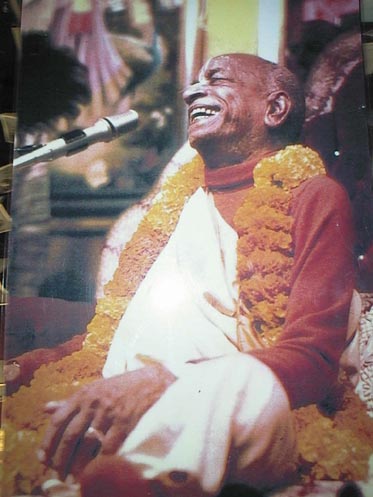
Visit "Prabhupada Connect" for all manner of Prabhupad
Nectar:
http://www.prabhupadaconnect.com/Index.html
Srila Prabhupada's Final Lesson Video - Downloadable and
viewing on-line
http://users.iskconludhiana.com/images/thumbnails.php?album=21


All Srila Prabhupada's original books
available for sale here.

Download all the Hare Krsna teachings which includes
all Vaisnava and
Vedic concepts by visiting one of the sites listed at
the following address.
http://www.geocities.com/suci123/bookdownloadsites1.html
The Bhaktivedanta Book Trust
Srila Prabhupad Memorial Library
http://www.krishna.com/main.php?id=33


33 Books Online Including Srimad Bhagavatam!
http://www.geocities.com/freeprabhupadabooks
The compressed "self extracting" file mentioned is now currently
available for download
http://www.krsnaconsciousness.org/Gauranga/Folio/BhaktivedantaVedabase_DOS.exe

Download or Listen to Prabhupad Bhajans HERE:
http://www.prabhupadavani.org/web/text/Bhajans.html


On-line 1972 McMillan edition - Bhagavad Gita As It Is:
http://www.asitis.com/

Bhagavad Gita AS IT IS on-line through the Tirupathi
Balaji site:
http://www.bhagavad-gita.us/

Bhagavad Gita Study guide on-line book:
http://chantandbehappy.com/gita/studyguide/StudyGuide-main.htm
Bhagavad Gita Study guides by numerous Iskcon devotees
- FREE downloads:
http://www.veda.harekrsna.cz/library/#3

All the Scriptures you'd ever need 4 FREE
http://www.hknet.org.nz/index-books.htm
http://www.hknet.org.nz/DDB.htm
http://www.hknet.org.nz/DDB2.html
last updated 4th August 2003


Srimad Bhagavad Gita AS
IT IS
Bhagavad Gita: Chapter
6 - Dhyana-yoga
TEXT 45
prayatnad yatamanas tu
yogi samsuddha-kilbisah
aneka-janma-samsiddhas
tato yati param gatim
WORD FOR WORD
prayatnat--by rigid practice; yatamanah--endeavoring;
tu--and; yogi--such a transcendentalist; samsuddha--washed off; kilbisah--all
of whose sins; aneka--after many, many; janma--births; samsiddhah--having
achieved perfection; tatah--thereafter; yati--attains; param--the highest;
gatim--destination.
TRANSLATION
And when the yogi engages himself with sincere endeavor
in making further progress, being washed of all contaminations, then ultimately,
achieving perfection after many, many births of practice, he attains the
supreme goal.
PURPORT by HDG Srila A. C Bhaktivedanta Swami Prabhupad:
A person born in a particularly righteous, aristocratic
or sacred family becomes conscious of his favorable condition for executing
yoga practice. With determination, therefore, he begins his unfinished
task, and thus he completely cleanses himself of all material contaminations.
When he is finally free from all contaminations, he attains the supreme
perfection--Krsna consciousness. Krsna consciousness is the perfect stage
of being freed of all contaminations. This is confirmed in the Bhagavad-gita
(7.28):
yesam tv anta-gatam papam
jananam punya-karmanam
te dvandva-moha-nirmukta
bhajante mam drdha-vratah
"After many, many births of executing pious activities,
when one iscompletely freed from all contaminations, and from all illusory
dualities, one becomes engaged in the transcendental loving service of
the Lord."
His Divine Grace A.C. Bhaktivedanta Swami Prabhupada
Copyright 1983 The Bhaktivedanta Book Trust International. Used with
permission.

Bhagavad Gita As It Is - http://www.asitis.com/
Bhaktivedanta Vedabase - Bhagavad Gita on-line http://bhagavadgitaasitis.com/
Bhaktivedanta VedaBase: Bhagavad-gita As It Is http://vedabase.net/bg/en
Bhagavad Gita Multi Media Web-version http://chantandbehappy.com/gita/
Listen to Bhagavad Gita on line - http://www.Gitamrta.org
View our Bhagavad Gita Overview:
http://www.hknet.org.nz/BG.html
Archive: http://www.cs.rice.edu/~vivek/btg/archive/
Home Page: http://www.cs.rice.edu/~vivek/btg/
Join Bhagavad Gita eGroups HERE
mailto:bhagavad_gita-owner@egroups.com


Prabhupada Uvacha:
(here's some nectar, sometimes it comes in the form of Srutakirti prabhu's
diary, other times from Govinda dasi's diary, Hari Sauri prabhu's Transcendental
Diary, Bhurijan prabhu's book, or sometimes from a letter, or other related
source, but still nectar...)
Difficulties in travelling
It seems that every time Prabhupada holds a big
initiation, he becomes afflicted with some type of physical ailment. He
now has a heavy cold which is worsening. It was bad enough today to warrant
him deciding not to have his usual massage with oils. Instead he had me
give him a dry one so that he would not have to take a bath.
He prepared to depart from the temple by 6:00
p.m. for the evening flight to London. His GBC and senior men, however,
came to petition him to remain in New York and rest until he got his health
back. Some suggested that he retire from all travel and engagements for
a few months. They said that even the airlines advise against traveling
with a cold. Air conditioning and pressurized cabins have adverse effects,
especially on the ears, which become blocked during descent. Having a cold
makes it difficult to clear them, and the pressurization brings dizziness
and sometimes air-sickness.
But His Divine Grace politely shrugged aside all
their suggestions as he waited by the elevator door. He stepped inside,
surrounded by as many sannyasis and GBC men that could fit in with him,
and began the descent. He turned to them and said with complete clarity
and gravity, "I simply want the benediction, like Arjuna, to fight for
Krsna to the last breath." He said it with such deep conviction that we
all fell utterly silent in appreciation of his full surrender to the Lord
and the great sacrifice he continues to make in the service of Krsna, for
our and the world's benefit.
- From the "A Transcendental Diary Vol 3" by HG
Hari Sauri dasa
To receive little snippets of nectar like this on a daily basis subscribe
HERE: or If you want to introduce anyone else in reading Srila Prabhupada
Nectars, please send their eMail addresses to mailto:krpamaya_gauranga@hotmail.com
Please Chant:
 Hare
Krishna Hare Krishna Krishna Krishna Hare Hare
Hare
Krishna Hare Krishna Krishna Krishna Hare Hare
 Hare
Rama Hare Rama Rama Rama Hare Hare
Hare
Rama Hare Rama Rama Rama Hare Hare
...................and be Happy

Listen to Srila Prabhupad on-line
....a different lecture, morning walk, conversation or
class daily.
"Peaceful People In Kingdom"
Srimad-Bhagavatam 1.10.6
Mayapura, June 21, 1973
Listen to the entire lecture on-line:
http://prabhupadaradio.com/M3U/Bhagavatam/m3u_II/SB219.m3u
Pradyumna: (leads chanting, etc.)
nadhayo vyadhayah klesa
daiva-bhutatma-hetavah
ajata-satrav abhavan
jantunam rajni karhicit
Translation: "Due to the King's having no enemy, the living beings were
not at any time disturbed by mental agonies, diseases, or excessive heat
or cold."
Prabhupada: So in the previous verse it has been described that nature
was favorable. The river, the hills, the mountains, forests, vegetables,
creepers, these are our natural surroundings. Animals... Everyone was complete.
It is a cooperation. So many living entities, according to karma, we have
got different bodies. Some has got the human form of body, some has got
the body of an animal, some has got the body of a tree, creeper. Sometimes
hills, mountains, also. Everyone. Their business is cooperation. We can
study from our own body. There are different parts of the body, but it
is a business of cooperation. Hand, legs, eyes, ears, nose, they are all
cooperating for the upkeep of the body. Similarly, all living entities
-- may be in different types of bodies -- they are meant for cooperating
in the matter of serving the Supreme Lord, central point. (aside:) Just
see the...
So if the government or the chief of the executive power, the king,
is just to the point, dharmena, as it was said, "Abiding by the religious
principles, ruling over the country," then everything, even natural elements,
they become cooperative. They must become cooperative. What is nature?
Nature is also another energy of the Supreme Personality of Godhead. So
the nature is also working under the direction of the Supreme Personality
of Godhead.
mayadhyaksena prakrtih
suyate sa-caracaram
hetunanena kaunteya
jagad viparivartate
[Bg. 9.10]
So Maharaja Yudhisthira's time, the cooperation was so complete that
everyone was free from anxiety, disease, calamities, natural disturbance.
In this material nature, or material world, we have got three kinds
of sufferings, tri-tapa-yantana. Sri Sanatana Gosvami inquired, "Why these
three kinds of miseries inflict pains upon me?" Ke ami kene amaya jare
tapa-traya. Tapa-traya. Tapa means painful condition, tapa. Just like if
you touch fire, it creates a painful condition by burning the part, similarly,
this world is also a blazing fire, samsara-davanala. The rascals, they
do not know. They are always out of the three kinds of miserable condition.
Everyone is in some way or other under these conditions. These conditions
means it is... These klesah, painful conditions, they are created by three
causes. What are those causes? Daiva-bhutatma-hetavah. Daiva means created
by the demigods. Daiva. Devata. Just like this rain department, water department,
is under the control of Indra. So Indra can supply water just to your requirement,
or sometimes he does not supply, or sometimes he supplies over, over requirement.
Ativrsti, anavrsti. Anavrsti means no rain, and ativrsti means excessive.
So we don't want excessive or less. We want just proper. So this is under
the control of the devata. You cannot say... You may be very great scientist.
You cannot say that "It is under my control." When there is no rainfall,
you cannot say, "All right, we are scientists. We are creating rain." You
can theoretically say, "Now we are making progress. In future."
All these rascals say, "In future." And we also believe, that "In future
these rascals will give us all happiness." Not now. Now you die. Just like
a clever lawyer, his client was condemned to death, to be hanged. I have
seen it in Allahabad high court. And still, he is patting him, "Don't worry.
I shall get you released by appeal. Now you can go to be hanged, and I
shall get you released." Like that. I have seen it. One big European barrister...
In those days European barristers were very valuable. Mr. Armstrong. I
had also one case in high court. So one man, one medical practitioner,
he killed his servant in the operation room very mercilessly. The servant
was implicated with his wife. To revenge, he called the servant in the
operation room. The servant did not know that he was to be killed. And
immediately he was captured, chloroform, and mercilessly killed with knife
and then packed up in a box. He was taking the corpse in a different place
to throw away. In the meantime a police officer was passing. He saw that
drops of blood is coming out of the box. He immediately arrested. So this
case was. Then the doctor was condemned to death. So Mr. Armstrong was
appointed his lawyer. So he was solacing, "Don't worry, I shall get you
released by appeal." So our so-called scientists, they also say like that:
"In future we shall do this. In future. Now you go to hell. That's all."
But in future they cannot do anything. Daivi hy esa gunamayi mama maya
duratyaya [Bg. 7.14]. Nature's law is so strong. The so-called childish
scientists, they cannot give any relief. That is not possible. That is
not possible. It is simply false promise. And those who are fools and rascals,
they believe that in future... Future, but what they have done in the past?
They cannot do anything.
Therefore it is said, there are three kinds of miserable conditions:
daiva, bhuta, atma. Daiva means adhidaivika, and bhuta means adhibhautika,
and atma means adhyatmika. Three kinds of miseries. Adhyatmika, pertaining
to your body and mind. Body, we have got, we have got experience, so many
bodily troubles, anxieties. If not body, mental. These are called adhyatmika.
Then adhibhautika. I am peaceful, but another neighbor, or another animal,
will give me some trouble. I am peacefully sitting here, but these flies
are giving me trouble unnecessarily. I have to take precaution. So there
are flies, mosquitoes, at night so many other animals, they come. Besides
that, my brother, my friend, they are also prepared to give me trouble.
Some way or other, other living entities causing some painful condition.
This is called adhibhautika. And adhidaivika. Daivika, painful condition
created by the demigods. Just like there is hurricane all of a sudden.
So many trees falls down, sometimes cottages devastated, overflood, excessive
rain, overflood, famine, pestilence. You have no control. You cannot control.
You can simply say, "In future." That's all. But there is no control.
So we are always in this painful condition. That is material life. But
those who have got eyes, sense, they can see. Just like Sanatana Gosvami,
he could see. He was prime minister, well situated materially. Learned
scholar, very intelligent. Otherwise how they could become Caitanya Mahaprabhu's
personal associates? Very qualified. Caitanya Mahaprabhu... When Sanatana
Gosvami consulted Jagadananda, that "I want to do this. What is your advice?"...
Sanatana Gosvami became infected with itches all over the body. And it
was, what is called, bleeding itches. Itches are two kinds: dry and sometimes
oozing water. What is called?
Devotee: Pus. Pus.
Prabhupada: Not pus. Weeping.
Devotee: Weeping.
Prabhupada: Yes. The technical name is weeping. Dry and weeping. So
it was weeping itches. And whenever he would go to Sri Caitanya Mahaprabhu,
immediately Caitanya Mahaprabhu embrace him, and the weeping secretion
will touch the body of Caitanya Mahaprabhu. So he thought that "I am suffering
from this disease. Caitanya Mahaprabhu (is) embracing me. I shall kill
myself. I shall commit suicide." So he consulted, not for suicide, but
leaving the place. So when he was advised, "Yes, you can leave the place,"
so Caitanya Mahaprabhu, when He heard this news that Jagadananda has advised
Sanatana Gosvami to leave the place, He became very angry, that "You have
the audacity to advise Sanatana Gosvami? Nonsense." He was so respectful
to Sanatana Gosvami. The same Sanatana Gosvami approached Sri Caitanya
Mahaprabhu, asking Him the question: "What I am? Why I am put into these
threefold miserable condition of life?"
So this is our position. We may be very great man in the estimation
of our friends and countrymen, but everyone is subjected to the miserable
condition of life. They cannot make any solution. That is not possible.
They have made a solution, big, big learned scholars, just that Mr. Kotovsky
said, "Swamiji, after death, there is no life. Everything is finished."
Unless they think like that, then life becomes more horrible, full of anxieties.
If they think of that there is another life and there is punishment and
reward, according to our karma, then their life is very horrible. So just
like the animals, poor animal, sometimes facing enemy, close the eyes,
as if there is no enemy, so they do like that, close the eyes. Children,
when there is danger, they close the eyes. They have no other means to
escape. So these people, they close the eyes. "There is no life after death."
Otherwise they cannot accommodate.
But there is life after death. Tatha dehantara-praptih. Tatha dehantara-praptih.
There is life after death, simply change of body. Now, there are so many
bodies, 8,400,000's of bodies. I can become next life a fly, according
to my karma. Or I can become next life Brahma. That is also according to
karma. But there are varieties of life. So the so-called scientists, they
do not know what is life after death, how it happens, how it is going on.
This is a great science. That you can understand from the Vedic literature,
not from your so-called scientific research. That is not possible.
So how these people, during the time of Maharaja Yudhisthira, were free
from all kinds of anxieties and diseases? Nadhayo vyadhayah klesah. If
you are in anxiety, then that will create a disease. Our this psychological
condition, physiological condition, is working in so subtle way -- little
shocking, little disturbance will create another disturbance. The Ayurvedic
medicine, they treat patients on this principle, how things are disturbed.
They have got their calculation: kapha, pitta, vayu. Tri-dhatu. This body
is a composition of these three dhatus. Yasyatma-buddhih kunape tri-dhatuke
[SB 10.84.13]. Kunape. This is a bag created by the interaction of the
three elements, namely, kapha, pitta, vayu, bile, mucus and air. This is
kaviraja treatment. They can understand the position of these three elements
by feeling the pulse. This is Ayurvedic science. If one kaviraja can learn
to feel the pulse, he can say everything. He can say when this man will
die, today or tomorrow or... Accurately he will say. The pulse beating
is so scientifically described in Ayurvedic science. As soon as he fixes
up the pulse beating, immediately the formulas are there: "Such kind of
pulse beating will create such and such symptoms." So you feel the pulse
and inquire the patient, "Are you feeling like this?" If he says, "Yes,"
then it is confirmed. The disease is confirmed. Then the medicine is there.
Very simple thing. Now in allopathic treatment, first of all you have to
sacrifice one chataka of blood, immediately. As soon as you go to the medical
man, in your country, he will take so much blood. First of all you have
to give your blood. Then fees. Then you have to purchase nonsense medicine.
So here also there are nonsense kavirajas also. So unless one is expert
in feeling the pulse, he is not kaviraja. That is the criterion.
Indian: It will take two years.
Prabhupada: Just see.
Indian: To pass education, takes two years' time.
Prabhupada: Yes. Two years' time. So this is the... This body is made
of three dhatu, and misadjustment of these three things... If the mucus
is increased, the other two decrease. In this way disturbance is created,
and that is the cause of disease. Adhayo vyadhayah. So if people remain
completely in hygienic principle, as they are prescribed in the sastras,
just like rise early in the morning, take bath, evacuate and chant Hare
Krsna mantra... If you follow the rules and regulation, then there will
be no anxiety, no disease. People become crazy when he is full of anxieties
or disease. If he is happy in every respect, then he does not become crazy,
he does not become enemy. If everyone is satisfied, then where is the chance
of becoming your enemy or my enemy? Everyone is satisfied.
So in Maharaja Yudhisthira's time, the government, the government was
responsible also to keep people peaceful, without any anxiety. That is
government. Without any anxiety. And now the government means full of anxieties.
You do not know how to sleep peacefully at night. You have to keep watchmen,
just see, enemies are coming or not, with torchlight. You see. This is
our position, full of anxieties. Even we cannot sleep at night peacefully.
This is government. And here you see, compare the government -- no anxiety,
no anxiety. Just compare. So what is the use of this rascal government?
The rascal government must be there because we are rascals. You cannot
complain against the government. Because we select. It is the days of democracy.
We elect our representative. So why you should, I mean to say, blame the
government? You have created the government. You have sent your representative,
a rascal, another big rascal. You are rascal, and another big rascal, you
have voted; so how you can expect good government? You send only big rascals.
That's all.
So there cannot be. That is stated in the Srimad-Bhagavatam, that in
the Kali-yuga, all the people will be rascals, sudras. Simply by manipulation,
if one gets vote, he captures the governmental power. Sudra. He's a sudra.
He is not a ksatriya like Maharaja Yudhisthira, trained up ksatriya. He
is a rascal, third-class man, fourth-class man. He gets the vote and we
give vote. So how we can be happy? How we can be carefree or anxiety-free
or disease-free? It is not possible. Therefore if the people in general,
they become Krsna conscious, they become trained up in Krsna consciousness,
they understand the value of life, how to live, then they can send good
representative. Krsna conscious man. Then the government will be nice.
Without becoming... Harav abhaktasya kuto mahad-gunah. If people are not
Krsna conscious, their so-called qualification has no value. Kuto mahad-gunah.
There cannot be value. There cannot be any good qualification of a person
who is not Krsna conscious, who is not a devotee. This is our conclusion.
We have got some test tubes. We can study man. He may become a very good
scholar, very good politician, very big minister, but we test whether he
has got any sense of Krsna consciousness. If he's not, immediately I understand
that "Here is a rascal number one." That's all. We have got test tube,
how much he is advanced in Krsna consciousness. If he's not, then he is
grouped immediately in four groups: duskrtina, means constantly committing
sinful activities; mudha, rascal; naradhama, lowest of the mankind; mayaya
apahrta-jnana, although educated with high degrees, his knowledge has been
taken away; asuram bhavam asritah, and demon.
na mam duskrtino mudhah
prapadyante naradhamah
mayayapahrta-jnana
asuram bhavam asritah
[Bg. 7.15]
Immediately we classify, "Here is a rascal number one, lowest of the
mankind," or "always engaged in sinful activities," or "whatever education
he has got, that is useless, because his real knowledge..."
Just like Professor Kotovsky, such a big professor, he says, "There
is no life after death." He's a rascal number one. What is the meaning
of this education? He does not know that the soul is eternal, and therefore
Bhagavad-gita teaches first, dehino 'smin yatha dehe kaumaram yauvanam...
[Bg. 2.13]. Na hanyate hanyamane sarire [Bg. 2.20]. "First of all understand
this: soul is eternal; you are eternal; you do not die, after the annihilation..."
This is the first education. And these rascals, they say there is no life
after death. So how much educated they are you can understand. They are
all rascals. And you may open big, big colleges, institution, providing
some rascal professor, rascal student, and beg the whole life, and sacrifice
everything. It is useless. Srama eva hi kevalam, simply wasting time.
dharmah svanusthitah pumsam
visvaksena-kathasu yah
notpadayed yadi ratim
srama eva hi kevalam
[SB 1.2.8]
Srama eva hi kevalam. You can do your duties very nicely, very good,
dharmah svanusthitah, but if you do not develop your, I mean to say, attachment
for Krsna... Vasudeva-katha rucih. "Oh, here krsna-katha is going on. Topics
on Krsna is going on. Let me hear it." Just like here. We are talking of
Krsna; nobody is coming. Nobody is coming. Only few selected. Vasudeva-katha
rucih. There is no taste for hearing krsna-katha. So such kind of education,
advancement of civilization, is srama eva hi kevalam, simply wasting time.
And if you waste your time in such foolish activity, then there will be
anxiety, there will be disease, there will be enemies, there will be disturbance
-- everything, one after another, one after another. Natural disturbance,
disturbance by other living creatures, disturbance by your body. So this
world will become hell. This is the position.
So just compare the present governmental situation and the time... A
king is supposed to be responsible for the citizen's peaceful life, no
anxiety, no disease. Adhayo vyadhayah. That is king. Just like one brahmana
approached Lord Ramacandra that "In the presence of father the son has
died. You are responsible. There must be something wrong in Your kingdom."
His son died. That is natural, that son lives, father dies. This is natural
death. "And what is this? The father is living and son is dying?" So king
was so much responsible, even the death must be systematic. There should
be no anxiety. There should be no disease. There should be no scarcity,
no famine, no natural disturbance. This is government. This is government.
Just try to understand the ideal government during Maharaja Yudhisthira's
time. Not only Maharaja Yudhisthira, all the kings. Rajarsayah. Imam rajarsayo
viduh. They were all great rsis, although they were ksatriyas. Brahmana
and ksatriya, they used to guide the general people. The high caste means
who would guide the people nicely. The brahmana by their Vedic knowledge,
perfect knowledge, pathana-pathana yajana-yajana dana-pratigraha. By high
learning, they would... They were not interested for capturing the government.
No. They had no time. But there was consulting body. Even Yudhisthira Maharaja's
time, there was consulting body, all the kings. The brahmanas and the rsis,
they would form a consulting body and give advice to the king: "My dear
king, do like this.' And they will abide. Just like head. Head. Head gives
the instruction to the arms. Not the arm gives instruction to the head.
Head. Brain. Mukha-bahuru-padebhyah.
So brahmana means this portion, head, brain. And ksatriya means this
portion, arm. And vaisya means this portion, belly. And sudra means this,
leg. So no part is unimportant. Every part is important for upkeep of the
body. But comparative study, this part is more important. If my head is
cut off, then all other parts may remain. It will not act. Similarly, at
the present moment there is no brahmana. All sudras, simply legs. If you
keep the legs of the body, what is the value of this body? There must be
head. Everything must be there. Everything must be there. The head must
be there, arms must be there, the abdomen must be there, the legs must
be there. Then it is complete body. Similarly, this scientific division,
catur-varnyam maya srstam guna-karma-vibhagasah [Bg. 4.13], the division
of the human society according to quality, the brahmana, ksatriya, vaisya,
sudra. Krsna says, maya srstam: "This is My creation for upkeep of the
social system."
So there is necessity of the sudras and there is necessity of the brahmana.
There is necessity of the ksatriya. Everyone is required to do, to function,
in his particular position. Then the society will be nadhayo vyadhayah
klesah. No more anxiety and no more disease. Everyone is peaceful, cool-minded,
cool-brained. Then chant Hare Krsna without any disturbance and go back
to home back, to Godhead.
Thank you very much. (end)
>>> Ref. VedaBase => Srimad-Bhagavatam 1.10.6 -- Mayapura, June 21,
1973
Listen to the entire lecture on-line:
http://prabhupadaradio.com/M3U/Bhagavatam/m3u_II/SB219.m3u
or receive in mailbox and Subscribe HERE:
mailto:lectures-subscribe@prabhupadavani.org
Sravanam kirtanam at:
http://www.PrabhupadaVani.org
© 2001 The Bhaktivedanta Book Trust International. Used with permission.


SRILA PRABHUPADA'S QUOTE OF THE DAY
"Try to remember Krsna always by following
the principles as you know them; namely rising early, taking bath, cleansing,
attending aratika, reading scriptures at least one hour or two hours daily,
chanting sixteen rounds on beads of Hare Krsna mantra, going for street
sankirtana, offering all your foodstuffs to Krsna, like that. In this way
very quickly you will make progress in Krsna Consciousness and become very,
very happy in your life."
[Srila Prabhupada, letter to Susan Beckam September
29, 1972]
Sign-up to receive these quote HERE:
mailto:haribol@pacific.net.sg

Bhaktivedanta Vedabase Network ...
http://vedabase.net/


The Scientific - Mathematical
Proof for God's existence:
http://geocities.com/sector114
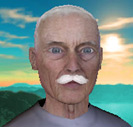
http://robot-hosting.com/php/login_nicholas.html
user name = guest
password = guest
(Collection of philosophical and mathematical proofs
for existence of God can be found in this site.)

Scientifically Philosophical Books for the layman
 ...
...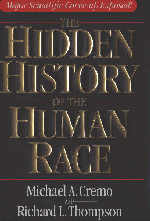 ...
...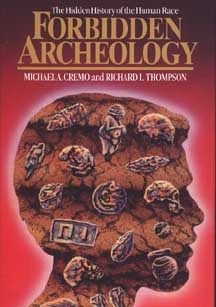 ...
...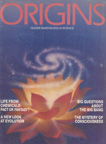
Click on any of these books to read more about them and where to get
a copy
or contact your local temple for purchases
sample of Life
comes from Life HERE.pdf

Lotus Imprints - Preserving Prabhupada's Legacy - The
Publishing House of Hari Sauri dasa
http://www.lotusimprints.com/

Quotes from Shastra - scriptures
View using Balaram font
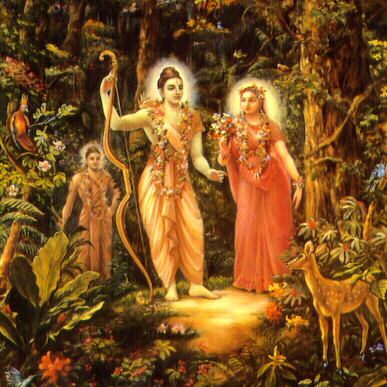
Sri RAma Navami -
the appearance day of Lord Sri RAma
last updated 5th April 2006
How to observe
RAmanavami, Fasting, Feasting - Instructions of Srila A.C.Bhaktivedanta
Swami Prabhupada
The appearance day of Lord RAma
- lecture by HDG Srila A.C. Bhaktivedanta Swami Prabhupada
The Ramayan story overview in
brief:
Lord RAma's appearance day
- Ramanavami
Ramanavami in brief
The Story of Lord Ramachandra
in brief from Iskcon Auckland 2006
Rama's qualities from Valmiki
Ramyana trans by Karnamrita dasa ACBSP
The Ramayana - the epic story
of the life of Lord RAmachandra
The Ramayan in RealAudio
Story form
The Untold Stories From the
Ramayana - The Killing of Ravana - Atmatattwa dasa
Vijaya Dasami page - the victory
of Lord RAma
View Scientific Proof
on the "man made bridge to Lanka" made by Rama and His army
The date of the appearance of
Lord Rama and subsequent pastimes
Read how Sri Lanka is not the Lanka of Ravan
Read the Valmiki Ramayan in sections on-line:
http://www.urday.com/ramayana.htm
BAL-KAND
AYODHYA-KAND
ARANYA-KAND
KISHKINDA-KAND
SUNDAR-KAND
LANKA-KAND
UTTAR-KAND
108 Names of Rama used in the
Ramayam
Mother Sita's page:
The Story of Vamiki Muni and the
condensed version of the Ramayana:
Balah kanda of the
Valmiki Ramayan:
Hanuman pages:
More links:
You will need the Balaram FONT on your
system to view some of this page
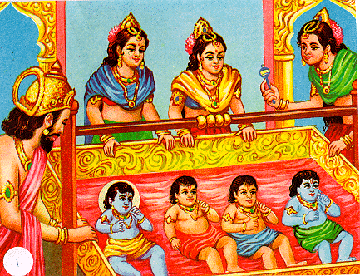
Sri Rama Avatara -
about the appearance day (birth) of Sri RAmachandra

 The
Ramayana - the epic story of the life of Lord RAmachandra
The
Ramayana - the epic story of the life of Lord RAmachandra
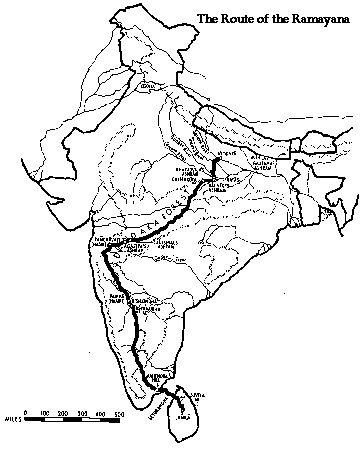
View Scientific Proof
on the "man made bridge to Lanka" made by Rama and His army

The Ramayan
in RealAudio Story form - by Amala Bhakta dasa

TheUntold
Stories From the Ramayana - The Killing of Ravana - by Atma
Tattwa dasa.
Vijaya Dasami
page - the victory of Lord RAma

To properly view this section you need the Balaram
font downloadable from HERE
Çré
Räma Navamé
Lord Rämacandra’s
Appearance Day
--
Hawaii, March 27, 1969
690327RN.HAW
Spoken by is Divine Grace
Srila A.C. Bhaktivedanta Swami Prabhupada
(kértana)
Prabhupäda: (chants maìgaläcaraëa
prayers)
rämädi mürtiñu
kalä-niyamena tiñöhan
nänävatäram akarod
bhuvaneñu kintu
kåñëaù
svayaà samabhavat paramaù pumän yo
govindam ädi-puruñaà
tam ahaà bhajämi
[Bs. 5.39]
This is a verse from Brahma-saàhitä
in which the incarnation of Lord Rämacandra is described. Rämädi.
Not only Räma, but there are many other, innumerable incarnations.
They are compared with the waves of a river. As the waves of the river
or the waves of the ocean cannot be counted, similarly, how many incarnations
are there of the Supreme Lord it is not possible to count. But out of them,
the principal names are mentioned in the çästras. Therefore
it is said rämädi. Rämädi means Räma and also
other, many incarnations. And they are existing. Not that one incarnation
appeared and it is finished. No. Not like that. Just like Lord Rämacandra
appeared on this planet, say millions of years before. He appeared in the
Treta-yuga. Treta-yuga means... We have passed only five thousand years
of this age, Kali-yuga. Before that, there was Dväpara-yuga. Dväpara-yuga
means 800,000 years. And before that, there was Tretä-yuga, which
continued for twelve hundred thousands of years. That means at least two
million years before Lord Rämacandra appeared on this planet.
So now Lord Rämacandra appeared
in Ayodhyä. There is a place in Ayodhyä, in northern India. There
He appeared. As Kåñëa appeared in Mathurä... That
is also northern India. And Mathurä is about ninety miles down southward
from New Delhi. You have heard the name of New Delhi, the capital of India.
So Ayodhyä is also situated about five hundred miles northeast of
New Delhi. So Lord Rämacandra appeared on this day. Today is called
Çré Räma Naumi. On the ninth day of the moon Lord Rämacandra
appeared. His father was the king of Ayodhyä, and he had three wives.
So out of... No. He had two wives. So out of two wives he got four sons.
Rämacandra is the eldest son. The life and activities of Lord Rämacandra
is... [break] ...in a book which is called Rämäyaëa. You
have heard the name of Rämäyaëa. Rämäyaëa
is also accepted as history. Vedic literatures are histories also. The
Puräëas, the Çrémad-Bhägavatam, Mahäbhärata,
and Rämäyaëa, they are counted amongst the history. The
history of Rämacandra is that His father wanted to retire. Daçaratha,
Mahäräja Daçaratha. And he decided to enthrone Lord Rämacandra
and retire. So everything was settled, but just one day before, his youngest
wife turned the whole thing into different way. Sometimes Mahäräja
Daçaratha was suffering from what is called whitlow, some trouble
in the finger? And this queen served him very nicely, and he was pleased.
And he said, “My dear Çarmiñöhä, if you want some
benediction from me, I can give you.” And she replied that “I shall ask
you for the benediction when I require it. Not now.” So just one day before
Lord Rämacandra’s coronation, she approached her husband Mahäräja
Daçaratha and reminded him, “My dear husband, you promised to give
me some benediction, and I told you that I shall ask you when I require
it.” Mahäräja Daçaratha said, “Yes, I remember. You want
some benediction just now?” She said, “Yes.” “And what is that?” She said
that “Rämacandra cannot be seated on the throne. My son should be
coronated, Bhärata.” He was surprised. It is a big demand. So he said,
“All right. That will be done. Your son.” Because formerly, the kings...
Not only formerly, even up to date, there are many kñatriya kings
in India. They have more than one wife. And they are, naturally, there
is rivalry between different wives. So the same thing. Human psychology
is the same. Even two million years ago the same mentality was there, and
she asked that “My son should be the king, not Rämacandra.” Rämacandra
happened to be the son of Kauçalyä, the elder queen.
So Mahäräja Daçaratha
agreed and called for Rämacandra. “My dear boy, your...” She asked
also that... She was very diplomatic. She wanted that Rämacandra go
to forest for fourteen years. The idea was political, that “The king may
agree to install my son just now. Now, after a few days, this Rämacandra
may come with His army, and there may be some difficulty to continue the
kingdom.” So she wanted that Rämacandra should go to the forest and
He should not come back till the end of fourteen years from this day. So
Mahäräja Daçaratha agreed. Because he was kñatriya.
Just see the promise. A kñatriya never goes back from the promise,
never refuses any challenge. If a kñatriya is challenged by somebody,
that “I want to fight with you,” oh, he cannot refuse. This is kñatriya
spirit. He cannot say that “I am now busy.” Suppose somebody comes to you,
that “I want to fight with you.” You may say, “What nonsense fight? I have
no time. We are in the temple.” But a kñatriya cannot deny that.
A kñatriya at once must accept. “Oh, yes. Come on.” And the weapon
should be, if he has no sword or weapon, he should be supplied weapon and
fight. This is kñatriya spirit. They were highly charitable and
chivalrous and keeping promise and with a great tendency for ruling over.
They shall rule over. Administrators. Their business is...
There are different prescription
for different classes of men for their livelihood. The brähmaëas,
they can pull on their livelihood by six ways. Paöhana paöhana
yäjana yäjana däna pratigraha. Six. And they must be qualified
with twelve high qualities. We have many times discussed. Out of that qualification,
truthfulness is the first item for a brähmaëa. A kñatriya
may speak lies. That is allowed, because he has to be diplomat, politician.
But a brähmaëa, oh, he’s not allowed to speak lie. This is the
system, caste system or varëäçrama system. Everyone was
trained. Because these four classes of men are required in a society. For
proper upkeep of society, one class of men must be very intelligent, highly
qualified, with all good qualities. They must be trained in that way, ideal
character so that people can see and follow them. Therefore brähmaëas
were taken to so much respect because they’re ideal character, learned,
and godly, knows the science, spiritual science. Therefore they’re held
in high estimation and topmost of the society. The next, the administrator,
administrative class, kñatriyas. They are trained how to kill. The
kñatriyas were allowed to hunt in the forest to learn the art of
killing because that was necessity for the kñatriyas. Kñatriya,
if he... If the king, if he finds somebody is doing wrong, he can immediately
chop off his head if he likes. The king was so powerful. And it is not
that if there was some war, it is not that the president or the king shall
sit down comfortably at home and ordinary soldiers will go and lay down
their life. No. Formerly, the king or the head of the state, he should
first of all go there in the fight. You see in the picture, the chief men
of the fighting in the Kurukñetra, both sides, they were arrayed,
this side, that side, with their chariot. Not that the head man, the chief
man, or the commander is taking shelter back side, protecting himself,
and poor soldiers are (chuckles) thrown into the fighting. No. These were
kñatriya spirit. And it is necessary that a class of men should
be trained up in that way, kñatriya, fighting men. In India, because
this training was there since a very long time, so there is no difficulty
in recruiting soldiers there. There is a class of men, they are very much
forward in fighting still. They are called... Just like the Gurkhas, the
Nepalese. You have heard the name of Nepal. Still a small state, independent
state. They are not within India. Between China and India. The whole Nepal
population, they are kñatriyas. Oh, they are very good fighters.
Similarly, the Sikhs, the Jätas. There are classes. So they’re always
forward for fighting. And you’ll be surprised that the British Empire was
voluntarily liquidated because they lost India. The Britishers, they understood
that because we are now losing India, there is no more possibility to keep
our eastern empire. Therefore they liquidated. Why? Actually, the whole
British Empire were being administered or managed by Indian soldiers, these
Sikhs and Gurkhas. They extended their empire. After taking their position
with India, they extended British Empire in the Middle East and Far East
simply by these Sikhs and Gurkha soldiers. They got supremacy on the Burma
and everywhere.
So there is necessity of a class
of fighting men. You are finding in your country difficulty in recruiting
because the recruiting process is wrong. You are recruiting from persons...
You are training persons just like çüdras, and you want them
to fight. How they can fight? It is not possible. So as it is stated in
the Bhagavad-gétä, that cätur-varëyaà mayä
såñöaà guëa karma vibhägaçaù...
[Bg. 4.13]. Lord Kåñëa said that “The four classes or
orders of the society, brähmaëa, kñatriya, vaiçya,
çüdra, is planned by Me according to work and quality.” So
this kñatriya quality men is also required, the brähmaëa
quality of men is also required, the mercantile community, they are also
required, and the laborer class, they are also required. Of course, laborer
class, they do not require any training. Laborer class means one who cannot
do anything, neither become brähmaëa, nor become kñatriya,
nor become vaiçya. That means the last balance of the population,
they are called laborer class, çüdra. Çüdra means
one who has no training. Çüdra has no saàskära.
Saàskära means training. Everyone is accepted as çüdra
by birth. Janmana jayate çüdra. Janmana means by birth. By
birth, everyone is born a çüdra, a fourth-class man. It is
to be accepted, and actually so. Just like a child, innocent child, what
does he know? He has to be trained. Either you train him as a brähmaëa
or train him as a kñatriya or train him as a vaiçya. Or otherwise,
he is çüdra already, born çüdra. Çüdra
has no training. Everyone, the basic principle, basic foreground, everyone,
it is accepted çüdra. Now, if you train him as a brähmaëa,
then he becomes a brähmaëa. If you train him as a kñatriya,
then he becomes a kñatriya. If you train him as a vaiçya...
So I think this is, this system is very scientific so that if you want
help of a really intelligent man or God realized man, it is ready, the
brähmaëa class. Just like if you require the help of a lawyer,
we have got so many lawyers. If you require the help of medical man...
Because there are trained men. Similarly, the society requires to train
a certain class of men to become brähmaëas. Just like we are
training the Kåñëa conscious. The Kåñëa
consciousness is meant for the brähmaëas. They are not meant
for fighting because they are not being trained for fighting. They have
been trained for becoming brähmaëas. Who is brähmaëa?
Brahma jänäti iti brähmaëa. The four divisions are
described like this. Janmanä jäyate çüdraù,
everyone is born çüdra. That is accepted. Saàskäräd
bhaved dvijaù. Now if you train him, never mind in which family
he’s born, you have to train him. Just like boys are sent to school for
being trained. So everyone is accepted as çüdra, but you now
train him. He goes to the guru-gåha.
Guru-gåha means teacher’s
house. Formerly, for being trained, there was no such big scale school
and colleges. Every village... Still, fifty years before in India, in every
village there was a small school conducted by the brähmaëa, and
the village children would be trained up there. So he was sent for training.
And there was no school fee. The boys will go there, and on behalf of the
teacher or spiritual master, they will go, brahmacäré, door
to door, and beg and bring forth alms, rice, dahl, grains, and everything.
That was the system. There was no school fee. There was no problem how
to send a boy to the school. Saàskära. Now he’s trained up.
The teacher sees the psychology of the boy, in which way he should be trained.
Either he should be trained as a vaiçya or he should be trained
as a kñatriya. So everyone was trained like that, but generally,
the son of a kñatriya... Just like Mahäräja Rämacandra
or Arjuna, from the very beginning they were trained as kñatriya.
Naturally, if somebody is the son of a medical man his father trains him
to become a medical man in future. That is the natural tendency. If the
boy is different altogether that is another question, but naturally, that
is the tendency. So a kñatriya’s son was trained as kñatriya.
A brähmaëa’s son was trained as a brähmaëa and a vaiçya’s
son was trained as a vaiçya, and çüdra had no training.
So gradually this became a caste system. Brähmaëa’s son became
brähmaëa. Because formerly, the training was there. But when
it is vitiated, although a person born in the family of a brähmaëa,
he is doing the work of a çüdra. So according to Vedic scripture,
one is classified according to his work and quality, not by birth. That
is the classification of çästra. Just like in the Bhagavad-gétä
the Lord says cätur-varëyaà mayä såñöaà
guëa-karma-vibhägaçaù [Bg. 4.13]. Guëa means
quality and karma means work. One must be qualified for the work and he
must actually work. Then he is counted classified into that, I mean to
say, category. Just like if you are simply trained or educated as a lawyer,
and if you are not practicing in the court, nobody comes to you to consult
as a lawyer. Nobody cares for you. You must be practicing also. Similarly,
to become a brähmaëa means first of all, he must know what is
Brahman and he must be actually situated in the activities of Brahman.
So devotional service are activities of Brahman. Activities in Kåñëa
consciousness means activities in Brahman. Brähme carati iti brahmä
brahmacäré. Carati means acts. Actually, he acts in life, applies
the principles of brähmaëa in his life, he is called brahmacäré.
So these were the trainings.
So just see how the training was,
that a kñatriya cannot refuse his promise. So Mahäräja
Daçaratha, he fulfilled the promise of his youngest wife and asked
his son, eldest son Rämacandra, “My dear boy, You’ll have to go to
forest for fourteen years. That is the desire of Your youngest mother.
And I promised that I shall fulfill her promise, uh, request. So please
accept.” Rämacandra said, “Yes father, I am ready.” Just see. This
is the quality. Out of the six opulences of God, this is one quality.
aiçvaryasya samägrasya
véryasya yaçasaù
çriyaù
jïäna-vairägyayoç
caiva
ñaëëäà
bhägam itéìganä
(Viñëu Puräëa
6.5.47)
How one becomes God? God is not manufactured
by vote. There are definition who is God. God must be the proprietor of
all the riches. Aiçvaryasya samägrasya. Samägra means
all. Nobody can compete with Him. Here, in this world, material world,
I am rich man, and there is another rich man who can compete with me. There
is another rich man who can compete with him. But nobody can compete with
God in richness. That is one qualification of God. Nobody can say that
“I am richer than God.” You can say “I am richer than Ford or Rockefeller”
or this or that. You can say. But nobody can say that “I am richer than
God.” Therefore in the Bhagavad-gétä it is said mattaù
parataraà nänyat asti kiïcid dhanaïjaya. Mattaù
parataraà nänyat kiïcid asti dhanaïjaya [Bg. 7.7].
Dhanaïjaya is a name of Arjuna, and Kåñëa said that,
“My dear Arjuna, there is nobody greater than Me.” So if anyone claims
that he is God, he must prove by practical example that nobody is richer
than him. That is the first. But unfortunately, we are accepting so many
Gods. A rascal in the street, he also claims that “I am God.”
So similarly, the other qualification,
nobody can be stronger than God, nobody can be wiser than God, nobody can
be more beautiful than God, and nobody can be more renouncer than God.
So here Rämacandra, Lord Rämacandra exhibited the quality how
He renounced the whole kingdom simply on the order of His father, His obedience
to father. He could have argued with His father, “My dear father, you,
simply for keeping your promise and actuated by the dictation of a woman,
you are doing this. Let us stop it. Everyone is expecting that tomorrow
My coronation will be there, and they love Me so much.” Because He... Just
like Kåñëa was so much loved, similarly, Lord Rämacandra
was the life of the people. They were very much expecting that Rämacandra
was going to be enthroned tomorrow. So how they were celebrating, how they
were decorating the whole city. Everything. He never argued. He accepted
immediately: “Yes, father. I am ready.”
So then one of the brothers, Lakñmaëa,
He also requested Rämacandra, “My dear brother, You also take Me.
I am Your constant companion. I must go with You.” So He said, “That’s
Your wish. Voluntarily, if You want to come, You can come with Me.” Then
Sétä, His wife, young wife, She also said, “I’ll go with You.”
Rämacandra requested His wife, “Oh, you cannot go with Me. It is very
difficult. You are a king’s daughter, and you are brought up in so nice
way, and you are so beautiful. You cannot go. You cannot take the trouble
of living in the forest.” So she said, “Oh, I am Your wife. Married wife.
So I must go even if You go to hell.” This is ideal wife. She could have
refused: “Oh, Your father has ordered to go to forest. You can go. I shall
go to my father’s house or I shall remain here.” No. This is ideal wife.
She must be prepared to accept any circumstances of the husband. Not that
when the husband is rich the wife is very faithful, and when he has come
down to be poor or he’s going to forest the wife gives up his company.
No. Wife means better half. She must abide. Just like, it is said, just
like a shadow follows the reality, similarly, the wife is the shadow of
the husband. Wherever the husband goes, she must go. Whatever the husband
wants, she must carry out. Of course, in this country this interpretation
is taken differently, that wife is made a slave. But actually, it is not
so. When Sétä was kidnapped in the jungle, Rämacandra
expected that, that she was beautiful, she was young, and “We shall be
in open jungle. It may be some demons may come,” and actually it so happened.
So for Sétä, Lord Rämacandra massacred the whole family
of Rävaëa. Only for Sétä. So as the husband, so the
wife. The wife was so faithful that she could not remain alone. She must
accompany the husband even in the forest. And the husband was so faithful
that, “Oh, my wife has been kidnapped.” So He massacred the whole family
of Rävaëa.
So these are ideal history how...
Rämacandra, Lord Rämacandra appeared on this world to educate
or to place ideal example of a king. How the king should be. Therefore
when there is good government... The example is given, Räma-räjya.
Räma- räjya. It is the kingdom of Lord Räma. Because everyone
was happy, everyone. There are so many instances in the life of Rämacandra.
One brähmaëa... Not brähmaëa exactly. Somebody came
to Rämacandra. Because at that time there was no court like this,
that you have to go to a court and apply with stamp fee. Then your judgment
will be delivered after six years. It is not like that. Anyone who has
got some complaint, he should... The king used to sit in the open audience,
and the citizens were allowed to approach the king and place their complaints.
Because there was no complaint practically. Everyone was happy. Very minor
complaint. So somebody came to Rämacandra, and he charged Rämacandra,
“My dear king, my son has died. How is that, in the presence of his father,
son can die? There must be something wrong in Your government.” Just see.
The charge is “Why my son has died before my death? This is unnatural.”
So there was nothing unnatural. The king was responsible even for severe
cold, severe heat. That we get from history of Çrémad-Bhägavatam.
That is stated. So the kings were so much responsible. They were always
thinking of the happiness of the citizens, and the citizens were also so
nice. One citizen approached Lord Rämacandra and His next assistant,
His brother, Lakñmaëa, informed Him that “He is a brähmaëa.
You were absent on Your tour for, I think for a fortnight or a month, and
this brähmaëa has not eaten even a drop of water during Your
absence.” Why? “Because he comes here to see You, darçana.” Just
like we come here in the temple to see the Deity. So Lord Rämacandra
was present personally. So he used to come. After seeing Rämacandra,
offering his obeisances, then he would go home and take something, his
breakfast. That was his vow. And because he could not see for a fortnight
or a month Lord Rämacandra because He was out on political tour, he
did not eat even. Just see. The citizens were similar to the king. So at
that time, there was a statue of Rämacandra which was being worshiped
in the family from Mahäräja Ikñväku. Mahäräja
Ikñväku, the son of Manu, happens to be the forefather of the
family in which Rämacandra appeared. So he was devotee of Lord Räma,
and he was worshiping the statue of Lord Räma. So that statue was
being worshiped by the family one after another. But when Rämacandra
was actually present He kept that statue in the closet of the room, and
when this brähmaëa approached and Rämacandra was informed
by Lakñmaëa that he is so steady and strong in his vow, so
Rämacandra ordered that he may be delivered that statue so that in
My absence he can offer respect to the statue and do with this. That form,
I mean to say, statue, or arca of Rämacandra is still existing in
South India. It is being worshiped from that time.
So these were the dealings of Rämacandra.
Then He, His younger brother Lakñmaëa and His wife went to
the forest, and His wife was kidnapped by the diplomacy of the demon Rävaëa,
and there was fight between Räma and Rävaëa. Rävaëa
was very, materialistically, he was very strong. But the thing is for fighting
with Rävaëa, Rämacandra did not come back to His kingdom
and take His army. No. He did not come back because He was ordered to live
in the forest. So He organized army with the jungle animals, the monkeys.
The monkeys. He fought with Rävaëa, an organized materialist,
with the monkeys. You have seen the picture. And He constructed a bridge
between India’s last point to the other side. Ceylon is considered to be
the kingdom of Rävaëa. So there was a bridge, and the stones
were floating.
So there are so many historical incidences
in the life of Rämacandra, and we should remember, because if we remember
why we are observing today fasting for Rämacandra... There were many
kings like Rämacandra. Because the kings were trained in that way.
Mahäräja Yudhiñöhira was also as good as Rämacandra,
and Mahäräja Parikñit was as good. There were many such
kings. But we are not concerned because He was a king. He is the King of
all kings, parameçvara. Because He is God, therefore we are observing
today. Rämädi-mürtiñu kalä-niyamena tiñöhan
[Bs. 5.39]. So He is not original form of God. The original form of God
is Kåñëa, and Kåñëa expands Himself
in various other forms. Advaitam acyutam anädim ananta-rüpam
[Bs. 5.33]. Ananta-rüpam means millions and millions. The Manu is
also incarnation of Kåñëa. So in one day of Brahmä
there are fourteen Manus. So Brahmä lives for one hundred years. Just
see how many incarnation of Manus are there even for one Brahmä, and
there are innumerable Brahmäs also. So, as stated in the Çrémad-Bhägavatam
that nobody can count how many incarnations are there, but some of the
chief incarnations are mentioned, and Lord Rämacandra is one of them.
So Lord Rämacandra, He killed Rävaëa
and He installed his brother. His brother was devotee, Vibhéñaëa.
So He did not go to conquer Ceylon, because He was emperor. He went to
punish that culprit Rävaëa, and He installed his younger brother
Vibhéñaëa in that... And He came back with Sétä,
and again He was installed after fourteen years, and His brother was so
faithful that so long His eldest brother was away, Rämacandra requested
Him that “Your mother wants that You should be king, and I also wish that
in My absence You should be king.” Bharata, He was so faithful brother,
He replied, “No. You are king. So long You are living, nobody can be king.
So I cannot be king.” Then He requested, “At least You administer.” Because
after the departure of Lord Rämacandra, Mahäräja Daçaratha
died out of the shock because Rämacandra was very pet son, eldest
son. He was going to be king, and by his order He was sent to the forest.
The father could not tolerate the shock. He died.
So Rämacandra’s life, God’s
activities, pastimes, if we hear, that means we are associating with Rämacandra.
There is no difference between His form, His name, His pastimes, and Himself.
He’s absolute. Therefore either you chant the holy name of Räma or
you see the statue of Räma or you talk of His pastimes,
transcendental
pastimes, everything, that means you are associating with the Supreme
Personality of Godhead. So we take advantage of these days when the incarnation
of God appears or disappears, and we try to associate with Him. By His
association we become purified. Our process is purification. Kåñëa
consciousness means simply we are purifying our consciousness. From the
birth, as I have explained, everyone is çüdra. Çüdra
means one who laments. That is called çüdra. For a slight loss
or slight inconvenience, one who laments, he is called çüdra.
And brähmaëa means one who tolerates. A çüdra has
no toleration. So kalau çüdra sambhava. Kalau means... This
age is called Kali. So it is the statement of the çästras that
in this age the whole population is çüdra. And formerly also,
by his birth, everyone was considered çüdra, but there was
training, saàskära. At the present moment, there is no saàskära,
there is no training. The training is only for earning livelihood. No other
training. How one can earn money and enjoy senses—that is the training
at the present moment. But actually, to make successful the human life
or the mission of human life, the Vedic culture is very nice. And by spreading
Kåñëa consciousness, by adopting the process of Kåñëa
consciousness, you can revive that cultural life, sublime life. If not
wholesale, if there are a few people trained up in this line, and they
become ideal examples to the society, immense benefit can be derived from
their examples of life. What is time? [break] (kértana) (end)
(A.C. Bhaktivedanta Swami Prabhupada
27th March 1969. The Appearance day of Lord Rama - Ramanavami, Hawaii,
USA.) http://vedabase.com

Sri Lanka is not the Lanka of
old:
On this website http://www.skyimagelab.com/hanmonbrid.html
there is the assertion that Ceylon was Lanka of the Ramayana. The assertion
is also made using typical offensive language of mundane scholars regarding
Sastras.
Today is Ramanavami on this date last year I started reading the Ramayana
(full edition). In the Ramayana we learn that Lanka was 100 yojanas from
the mainland. Since a yojana is about 8 miles that would mean that it was
about 800 miles from the mainland. Much further than current Sri Lanka
aka Ceylon. Also the Suryasiddhanta mentions that the meridian which passes
through Ujjain also passes through Lanka. (The Suryasiddhanta and all of
the Jyotish literature uses the meridian passing through Ujjain as the
reference point just as today the meridian of Greenwich is used for astronomical
calculations and time keeping.) Ujjain is 75 degrees 47 minutes east of
Greenwich if you look south in the Indian Ocean the closest land would
be the Maldive Islands in the Lakshadvip Sea (100,000 Islands sea). So
I would suggest that is the actual area of the original Lanka not Ceylon
which only recently (1972) renamed itself as Sri Lanka. The actual Lanka
is submerged and only some of its highest points are above the ocean. In
any case the real Lanka was several hundred miles to the South West of
current Ceylon-Sri Lanka.
Ceylon has been known by that name for at least 2500 years. It was the
name that the Romans, Greeks and Persians knew it by (Greek traders in
the Ptolomiac and Roman empires regularly went to South India and even
onto China via the well known trade route starting from Alexandria, down
the Nile, portage across to the Red Sea, down the Red Sea and then straight
across the Arabian Sea to modern Kerala. This is how Saint Thomas, disciple
of Christ, got to South India and why Kerela has 20% Christians since that
time. The many hordes of Roman dinari (gold coins) that have been excavated
in the extreme south of India also attest to this fact.
In ancient times it was also called Taprobane (especially by the Greeks)
and Serendip, which was derived from Sanskrit for Sinhala Dvipa, the island
of Singhalese. The Singalese were originally from the Kalinga region (Orissa)
and invaded the island some time before 500 BC. It morphed into Ceylon
from Serendip.
The English word Serendipity--which is finding something unexpected
and useful while searching for something else entirely. For instance, the
discovery of the antibacterial properties of penicillin by Alexander Fleming
is said to have been a serendipitous discovery--is etymologically derived
from its possession by the heroes of the Persian fairy tale "The Three
Princes of Serendip"
In any case by what ever name you call it modern Sri Lanka-Ceylon is
not the Lanka of the Ramayana because it is much too far to the North East
by several hundreds of miles from the location of Lanka indicated in the
Ramayana and the astronomical Siddhantas and other Jyotish literature.
yhs
Shyamasundara Dasa
http://www.ShyamasundaraDasa.com

Instructions by Srila A.C. Bhaktivedanta Swami Prabhupada, How to observe RAmanavami,
Fasting, Feasting
More links to Lord Rama related pages:
The Ramayana - A brilliant picture book of the epic the Ramayana:
http://www.lakshmi.com/divali/rama1.htm
The Ramayan in RealAudio Story form - by Amala Bhakta dasa:
http://radiostories.com/ramayana/ramayana-1a.html
The Stories From the Ramayana:
http://www.indiadivine.com/hinduism-stories.htm
Valmiki Ramayan Amar Chitra-katha Comic on-line:
http://www.askasia.org/adult_free_zone/virtual_gallery/exhibitions/
Valmiki Ramayana with Sanskrit verses and English trans:
http://www.valmikiramayan.net/
...the Ramayana - an enduring tradition:
http://www.maxwell.syr.edu/maxpages/special/ramayana/
Bala kanda of the Valmiki Ramayana - sanskrit verses and English
trans:
http://www.geocities.com/~ramayanam/Bala_1_frame.htm
Ramayana - A Picture Gallery:
http://home.att.net/~s-prasad/ramimage.htm
Sri Nama Ramayana Index:
http://home.att.net/~s-prasad/namarama_en.htm
Valmiki Rishi's Ramayana part 1a - Radio Story Format:
http://www.radiostories.com/ramayana/ramayana-1a.html
The Valmiki Ramayana Audio Cassettes:
http://www.ramayanaudio.com/
Ramayana page - links to Adhyatma Ramayana - Tulasidas Ramayana -
Yogavasistha:
http://www.hinduism.co.za/ramayana.htm
Adhyatma Ramayana overview:
http://www.hinduism.co.za/ramayana.htm#Adhyatma
Ramayana
Valmiki Muni's page:
http://www.hknet.org.nz/Valmiki.html

Lord Rama pic in the forest top of page - Copyright ©2005
The Bhaktivedanta Book Trust
International, on the web at http://www.krishna.com.
Used with permission.

All pictures from Srimad Bhagavatam and Iskcon works - Copyright ©2005
The Bhaktivedanta Book Trust
International, on the web at .http://www.krishna.com/.
Used with permission.

Courtesy of http://www.vedabase.com/
used
with permission









![]()
![]()
![]()
![]()
![]()

![]()
![]()
![]()
![]()

![]()
![]()
![]()
![]()




















